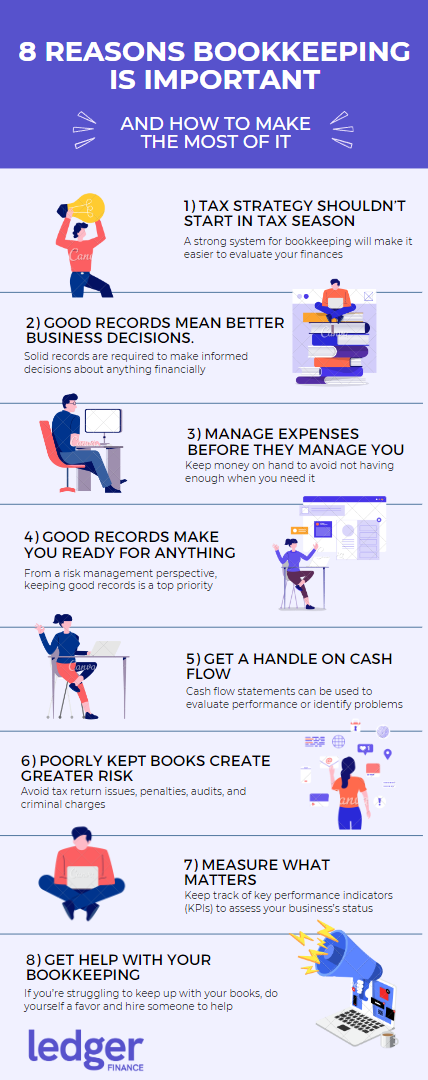You didn’t go into business to be an accountant.
Most business owners find themselves so caught up in the day-to-day of running a business that the financials can fall by the wayside. While bookkeeping isn’t the most exciting aspect of entrepreneurship, it is the foundational backbone of your business. If you’re not keeping track of all your business-related income and expenses, you could be making mistakes that could end up costing you thousands of dollars over the long term.
You might be thinking...
Why do small businesses need bookkeeping? What does this look like from a cost-benefit perspective? And what do you need to do to make sure it gets done properly?
Here are 8 reasons why bookkeeping is important and to make the most of it.

Tip 1: Tax strategy shouldn’t start in tax season.
As the world becomes more reliant on technology, complex tax laws make it more important than ever to make sure your financial records are organized so you can plan effectively. A strong system for bookkeeping will make it easier for you to evaluate your cash flow from the past, track all of your income and expenses in the present, and make tax planning decisions for the future. You want to make these decisions before year end to save on your tax bill for that year. Finding out you have a big profit in January doesn’t serve you well because you won’t be able to make decisions to lower the bill that early. For example, if you find yourself heading towards the end of your fiscal year with a little extra profit, you might consider reinvesting in some new equipment or a new marketing channel (and taking the tax deductions that come with those investments).
Tip 2: Good records mean better business decisions.

As a business owner, you have to make mission-critical decisions every day. With solid data by your side, those decisions become easier. A good bookkeeper can you help understand how much money you’re bringing in each month, whether or not you’re meeting your financial goals, and how much tax you owe. Without knowing the numbers, it's almost impossible to make good financial decisions about anything. Decisions like hiring staff, buying new equipment, or upgrading services require proper financial planning in advance. Ultimately, having a firm grasp on both income and expenses allows for better decision-making across the board for your business.
Tip 3: Manage expenses before they manage you.
As a business owner, you know how quickly money can disappear from the bank account. Everything can seem like a necessary expense and soon you’ll find yourself drowning in payments without enough income to cover them. Even if you have one good month, you’ll pay off a bunch of behind expenses, just to find yourself in the same place next month. If you don’t know where your money is going or if it’s being well spent, you risk not having enough available when you need it. This will become a problem if there is an emergency and you need quick access to cash. A good bookkeeper can ensure all of your expenses are categorized and keep an eye on if things are getting out of control. The more detailed your budget, the better control you will have over your spending habits. Once you know what's coming in and out each month, use that information as an opportunity to get creative with ways to save cash. Things like telephone service providers or cable companies may seem necessary but tend to have unnecessary high monthly fees attached. With a detailed snapshot of your expenses, you can pinpoint exactly where money can be saved. Are you paying overpriced premiums on manufacturing? Are neglecting new cheaper substitutes for the services you use? Did you forget to cancel that free trial before it ended? We sure hope not, as these expenses can pile up quickly.
Tip 4: Good records mean you’re ready for anything.
 Good records are an essential part of maintaining a successful business. Record-keeping helps you manage your finances, reduce your tax duties, keep you in line with the law, maintain customer satisfaction, and monitor key metrics. So why do so many small businesses fail to take steps to ensure good record-keeping? Well, most of the time it’s because they underestimate how it relates to their core business. It may seem like overkill to keep every invoice and receipt when you’re not a giant company. However, starting your bookkeeping early will definitely have benefits in the long run. If you think about it from a risk management perspective, keeping good records is a top priority with all the issues it can prevent. After all, if there’s no one around who knows what happened during some key period in time (say 10 years ago), if you’re ever audited by the IRS it may be hard to explain why you did some of the things you did. It will also be much harder for a manager or employee to step into your shoes and keep things running smoothly while you are away or incapacitated.
Good records are an essential part of maintaining a successful business. Record-keeping helps you manage your finances, reduce your tax duties, keep you in line with the law, maintain customer satisfaction, and monitor key metrics. So why do so many small businesses fail to take steps to ensure good record-keeping? Well, most of the time it’s because they underestimate how it relates to their core business. It may seem like overkill to keep every invoice and receipt when you’re not a giant company. However, starting your bookkeeping early will definitely have benefits in the long run. If you think about it from a risk management perspective, keeping good records is a top priority with all the issues it can prevent. After all, if there’s no one around who knows what happened during some key period in time (say 10 years ago), if you’re ever audited by the IRS it may be hard to explain why you did some of the things you did. It will also be much harder for a manager or employee to step into your shoes and keep things running smoothly while you are away or incapacitated.
Tip 5: Get a handle on cash flow.
Unlike an income statement, a Statement of Cash Flows reflects all activities that result in cash in or out. A good bookkeeper will regularly prepare cash flow statements for a better understanding of a company. These statements can be used to evaluate performance or identify problems, helping you see where your company’s money comes from and goes, at any point in time. You should have one prepared by an accountant once per quarter, if possible. If not, try tracking it yourself with accounting software like QuickBooks. This will give you a better idea of how much cash is coming into your business each month—and how much it’s going out. Thus, it will allow you to make better decisions based on accurately portrayed data. If there are any issues with cash flow, you will be able to sniff them out and deal with them immediately.
Tip 6: Poorly kept books open you up to a greater risk of tax penalties and audits
When you see mistakes on a business tax return, you can be sure bad books aren’t too far behind. Poor bookkeeping practices can result in reporting errors. This could raise a red flag that causes IRS auditors to take a closer look at your finances. If they find anything suspicious, you could face fines — or worse. You’ll find that staying on the good side of the IRS will save you tons of time and energy in the future. You can’t build the next big thing if you’re too focused on recreating 10 years of books due to a demand from an Auditor. If you don’t keep good records, there’s no way to prove what you paid for certain expenses (such as business travel) or how much income you received from various sources (such as freelance work). If an auditor sees that your business has lost money year after year, he might think something fishy is going on—even if there isn't any wrongdoing involved. If you want to grow your business you need to make sure you are protected in the first place, as sometimes, your best defense leads to a great offense!
Tip 7: Measure what matters to ensure you’ll hit your goals
Keep track of key performance indicators (KPIs) to assess your business’s status. For instance, when trying to grow your business, you might set a target of X number of new clients per month or Y% growth in monthly subscribers. With the records and books being organized, you can easily set up and track KPIs to physically track how your business is performing relative to your goals. Financial KPIs are a good place to start when evaluating your business. Revenue: How much money is coming into your company from sales? Profit margin: What percentage of revenue does it take for a company to break even? Profitability: Is there a profit after subtracting all costs from revenue? Growth rate: What is your annualized revenue growth rate over time? These metrics work hand-in-hand to help you understand everything that’s going on with your business.
Tip 8: Get help with your bookkeeping if needed.
If you’re struggling to keep up with your books or not keeping books until the end of the year, do yourself a favor and hire someone to help. You might be thinking, can I do my own bookkeeping for my business? Well, bookkeeping is time-consuming, and oftentimes there are complexities (like an S corp or partnership) that require professional assistance. Yes, you can do it in excel once at the end of the year or hire a family member—but while you may save money on the cost of the service you may be losing out on tax savings that an advisor can help you identify. Hire a good bookkeeper who can ensure your books are properly set up so you’re not always scrambling when tax season rolls around. This will save you tons of time and energy with your finances, and often will pay for itself in the long term! Having your books done professionally will keep you worry-free from any financial chores so you can focus on running your business instead.
At LedgerFi we specialize in helping small business owners like you take control of their books. As a full-service firm, we take care of bookkeeping, accounting, and taxes, so we guarantee that we can help you with all of your number-related issues.
